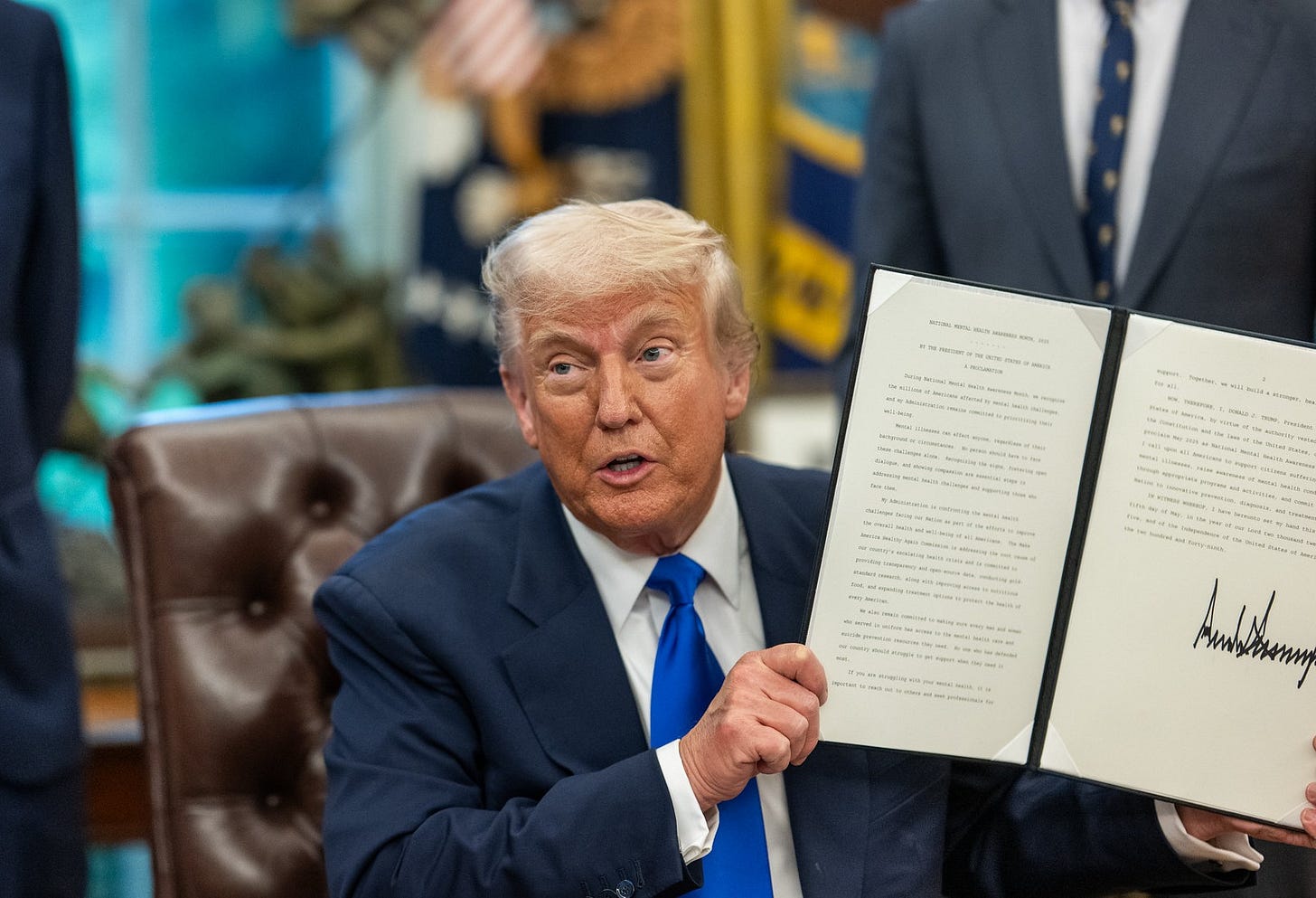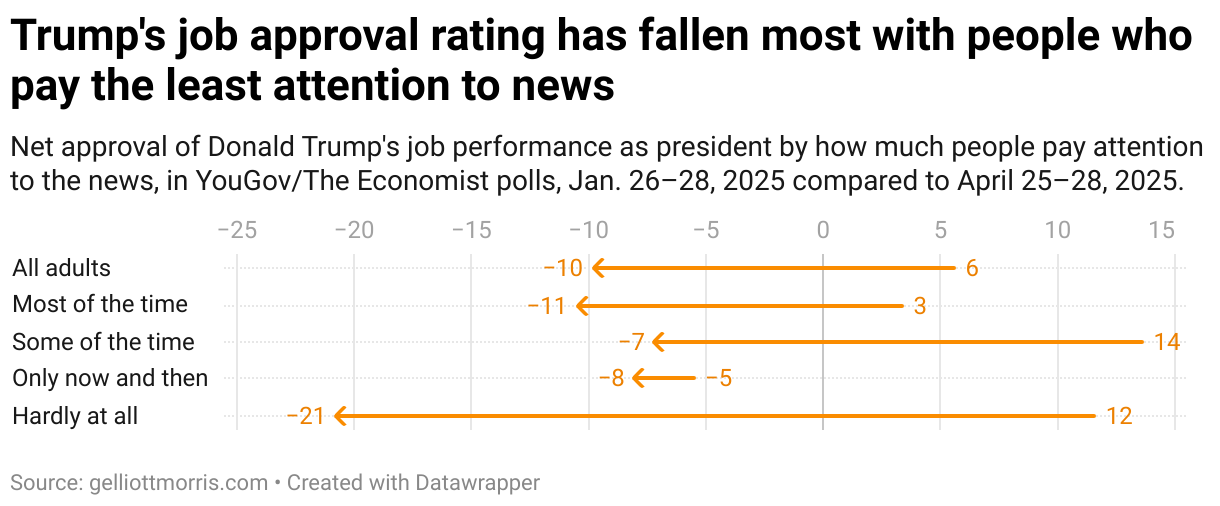Trump's Powers of Persuasion Are Failing Him
There are some things you just can't spin away, especially with spin this lame.
Thank you for reading The Cross Section. This site has no paywall, so I depend on the generosity of readers to sustain the work I present here. If you find what you read valuable and would like it to continue, consider becoming a paid subscriber.
You have probably had the experience of watching Donald Trump say some spectacularly dumb, false, or outrageous thing and responding incredulously, “Are people actually going to believe that?” A distressingly large proportion of the time, the answer is yes, a good number of people — sometimes even a majority — will believe it.
For anyone who opposes him, watching him lie or just say idiotic things is a doubly frustrating experience, painful because of the loathsome utterance itself and what immediately follows, the sickening suspicion that so many of your fellow Americans are going to buy it.
But if you do oppose him, there is reason for hope. Trump’s powers of persuasion are substantial but hardly limitless. His success has always depended on luck and timing, and he has been in his most advantageous political position when somebody else was in power and could thus be blamed for anything and everything that anyone might not like. When he is the one carrying responsibility, most people turn away from him, as they are doing right now. That’s when his vulnerability is revealed.
Trump can’t avoid blame anymore
For the second time, Trump was bequeathed a strong economy by a Democratic president; the difference this time is that he has undertaken radical policy changes that are rapidly undermining what he was given. By a wide variety of measures, people are seriously freaked out about the possibility that we’ll plunge into recession because of his trade war and the rapid disassembly of the federal government; for instance, consumer confidence has dropped to its lowest level since the start of the covid pandemic, when it seemed as though the world was about to end.
The master spinner has dealt with that fact by saying it isn’t his fault. Which led to this pathetic exchange in his recent interview on Meet the Press:
Asked when it becomes “the Trump economy,” he responded, “I think the good parts are the Trump economy and the bad parts are the Biden economy.” That is not just laughable to people who don’t like Trump, it’s laughable to anyone. I’m sure more than a few of his own supporters cringed when they saw it.
Trump has always counted on the public’s limited powers of understanding and deliberation — the more impulsive, uninformed, and unable to digest complex arguments they were, the better it would be for him. But that same superficial understanding of politics and policy may now be working against him. It’s why “Trump take egg” has become a ubiquitous meme: The premise of the joke is that it’s an argument against Trump so simple that even basic grammar is unnecessary to communicate it. He promised to bring down grocery prices, but he didn’t. Trump take egg.
That’s why this is one of the most intriguing poll findings of recent days, from G. Elliot Morris:
Trump’s net approval has dropped since he took office among all groups, but by a remarkable 33 points among those who don’t pay attention to news.
This is a reversal of what happened in the 2024 election, when he performed best among those who pay the least attention to political news. Those are also people whose political attachments are less firm; they’re more likely to shift their views on the president based on what’s happening in the world or their own lives. If you’re a political junkie, an economic downturn is not going to change your view of Trump, nor will an economic boom. But if you never think about politics, it might. And that’s an important fact to keep in mind about those low-information voters: They may have been hoodwinked by him at one time or another, but they can change their minds again.
What Trump is trying to do now is similar to what Democrats were lectured over and over about supposedly doing in 2024. Every time they spoke about the economy, Joe Biden and his allies would say “We know prices have gone up, and we’ve been through some hard times, but we’ve made a lot of progress and things are getting better.” It was 100% true — inflation had come down, unemployment was low, there was more job creation than in any single presidential term in history — and they were never anything but apologetic about the economy. Yet they were scolded nevertheless for even suggesting that Biden’s policies had a salutary effect, with one pundit after another responding, “How dare you deny the reality of people’s lives? You can’t tell them their suffering isn’t real! Curse you, curse you I say!”
The propaganda has already failed
The Trump argument today is that we’re going through a wee period of adjustment as his brilliantly designed and executed tariffs are implemented, and what awaits us on the other side is prosperity such as none of us has ever seen. If you bought that, you’d believe that tariffs are a good idea, and you might even be willing to endure some short-term pain. But that’s not how Americans are reacting. In fact, Trump’s approval on the economy is about the worst it’s ever been. Here’s another poll:
They’re basically right about this: Tariffs will definitely raise prices, and might create some manufacturing jobs, though probably not many (and maybe not any) because they’re the product not of methodical planning but Trump’s ever-changing whims.
Keep in mind, he spent the last year trying to convince everyone that tariffs are awesome. How many times have you seen him say tariff is “the most beautiful word in the dictionary,” and “tariffs are going to make us rich as hell”? So many times. And yet, the propaganda effort failed. Somewhat remarkably, there has been enough discussion of tariffs both in the media and among people that as a whole, the public seems to understand what they’re about and what they’re likely to produce.
Now Trump has decided that the clever argument is to basically tell people to suck it up, “it” being shortages and price increases. Or has he keeps saying again and again, “Maybe the children will have two dolls instead of 30 dolls.” I have not seen this idea message-tested, but if you unpack it, it doesn’t sound very persuasive. It seems to be about the holidays a half-year away, if we assume that no one will be confiscating the dolls children already possess. And who gets their child 30 dolls for Christmas? A billionaire who thinks that conspicuous over-consumption is a substitute for love, I guess. But not a normal person.
Most important, telling people that they’ll be in such dire financial straits this year that their gift-giving to their children will have to decline by 93.33 percent could only mean that we’re headed for an economic cataclysm unseen since the Great Depression, or perhaps hyperinflation reminiscent of Zimbabwe circa 2008. Keep making that argument, Donald.
So no, Trump does not have the power to mesmerize the public. And it’s getting more obvious all the time.





This is spot on, Paul. There comes a point where it simply defies belief and even the most credulous realize that what is happening is a direct reaction to what Trump is doing.
When someone 'jumps the shark' isn't as important as when the majority of people realize they did. It's all downhill for that person from then on.